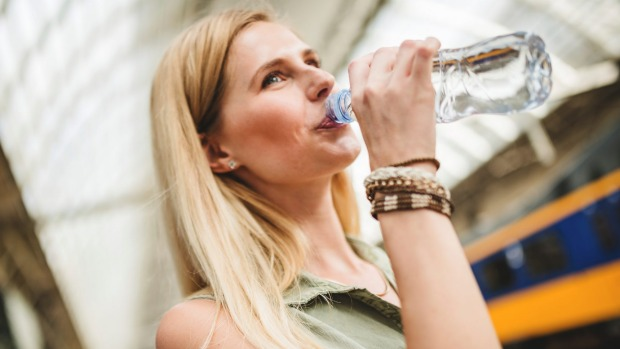 |
| Reviews and Templates for Expression We |
Consumer NZ: Don't buy into the bottled water myths

Don't believe the marketing hype around sports drinks or vitamin water. The main "carbohydrates" and "electrolytes" in sports drinks are plain-old sugar and sodium.
OPINION: It's a marketing triumph worthy of Mad Men's Don Draper: getting people to pay more for bottled water than they pay for petrol, when there's perfectly good water available for next-to-nothing from the tap.
I took a break while writing this column to drive down to the local petrol station, where I filled my Subaru with Z91 at $1.98 a litre. Then, I ventured into the shop and looked at the drinks cabinet, where I found a bottle of Pump Spring Water available for $3.59 for 750 millilitres, equivalent to $4.79 per litre.
I hesitated, but was in dire need of a drink and the deadline was looming, so I reluctantly shelled out almost twice as much per litre for plain old water than I paid for petrol to fuel my ageing hatchback.
The water "bottled at source from the Blue Spring in the heart of the Kaimai Ranges", left a sour taste once I was back at the office. That's because I started researching the murky world of bottled water, and made some shocking discoveries.
READ MORE: Consumer NZ offers tips to help car buyers get a good deal
According to the Pacific Institute, a think tank specialising in global water issues, it takes two litres of water to produce the plastic needed for a one-litre bottle. That means every litre of water sold actually represents three litres of water.
It gets worse. The Institute did the sums on how much energy is consumed in extracting and bottling the water, shipping it to the user, cooling it in grocery stores or your refrigerator then sending it on to the recycling plant or landfill. It found the amount of energy can be as much as filling a plastic bottle one quarter fill with oil, with all the carbon emissions that entails.
But what about the purported health benefits of bottled water?
There's been a lot of hype recently about "alkaline water", with some claiming it's great for detoxing and can increase vitality and slow the ageing process. Alkaline water is any water with a pH greater than 7.0, which means it's the opposite of acidic (a pH of 7.0 is neutral).
Mineral waters, including Evian and Fiji Water, are often alkaline, which means they're rich in minerals like calcium, silica, potassium and magnesium.
Unfortunately, there's no evidence of any health benefits from alkaline water. The main problem is alkaline food and drink is neutralised by stomach acid as soon as it hits your gut, meaning there's no effect on the overall acid/base balance of your body.
There is a place for consuming alkaline products, like antacids to alleviate acid reflux, but mineral water is usually only slightly alkaline so it's probably not a silver bullet if you have an upset stomach.
Another big reason many of us gulp down bottled water is the taste of tap water. That's because most of New Zealand's town water supplies have chlorine added to kill germs as your water makes its way through kilometres of pipes. The amount of chlorine added is nowhere near enough to pose a health risk, but some people do pick up hints of swimming pool in their tap water.
However, there's a better work-around for this than shelling out for expensive bottled water.
Cooling a jug of tap water in the fridge for half an hour should mask the taste and smell of chlorine. Alternatively, consider a water filter that removes chlorine, like an activated carbon filter
You don't have to shell out for an expensive bench-top under-sink filter, as there are jug filters available for well under $100. But make sure its rated to remove chlorine, and check how much replacement filter cartridges cost.
So, in light of all this, how could I live with myself after buying that bottle of water? Well the fact is I needed a drink, and on past form the bottle it came in will give me several weeks' use. But I certainly won't be making a habit of it.
Consumer NZ's top tips for drinking water:
- Don't let tall tales about dangerous chemicals scare you into buying an expensive water filter – almost all our tap water is safe to drink (97 percent of our water complied with National Standards for protection against bacteria in 2014).
- Don't believe the marketing hype around sports drinks or vitamin water. The main "carbohydrates" and "electrolytes" in sports drinks are plain-old sugar and sodium.
- The idea that "if you're feeling thirsty, you're already dehydrated" is a myth. For healthy adults, thirst will kick in before any of the signs of dehydration. Just drinking when you're thirsty is fine.
- Don't get sucked in by the health benefits of alkaline water. There's no evidence it's any better than tap water.
- Whole-home water filters are usually overkill, unless you've got problems with hard water. If you want to remove the taste of chlorine, get a jug filter or a filter at the tap.
|
|
|
|
Copyright remains with the original authors |